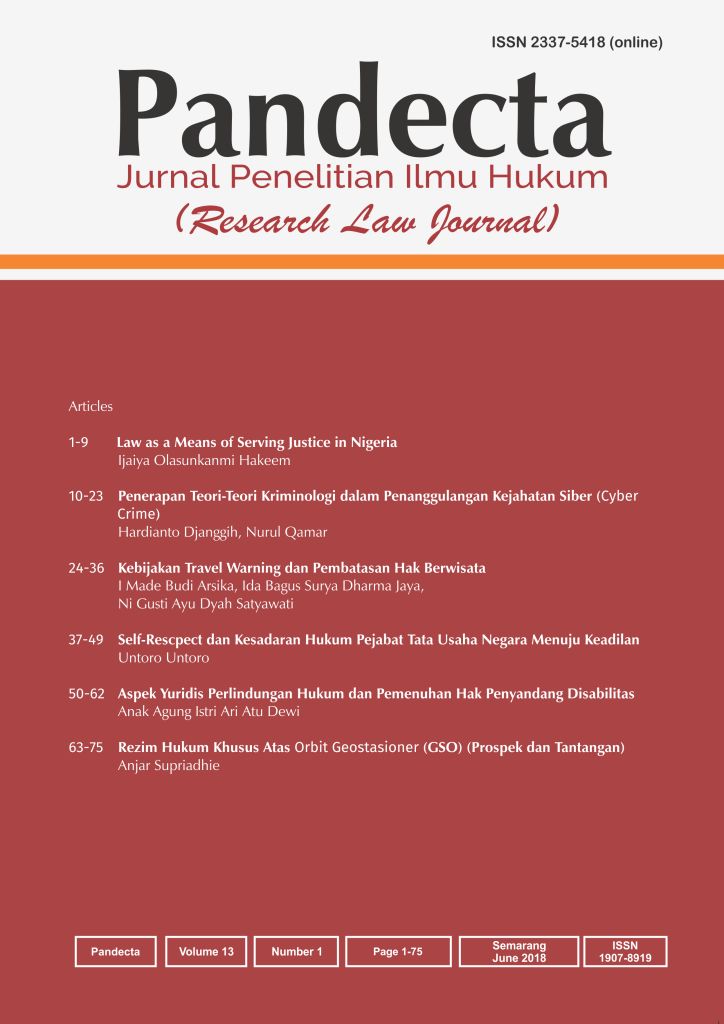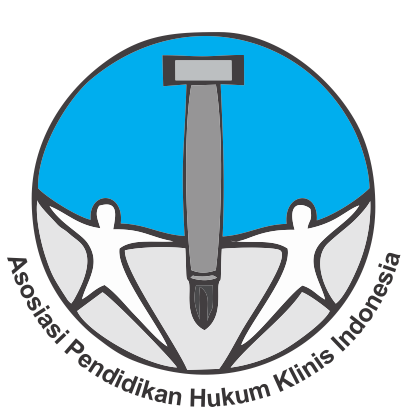World Trade Organization, Negara Berkembang dan Special and Diferrential Treatment
(1) Center for International Law Studies (CILS) Universitas Indonesia
Abstract
Free trade is an issue that has gained strength in today’s global society. Various multilateral treaties, regional and bilateral governing the suppression of trade barriers more. WTO as a central rule and is the main legal source of free trade has been running for more than a decade. Since the establishment of the WTO proved that the participation and the international community in global trade is increasing. However, some criticism arose primarily from developing countries that have not benefited from free trade. This issue arises in WTO negotiations that resulted in the concept of Special and Differential Treatment (SDT), which was adopted in the WTO provisions. This study raised the major themes of the provisions of the WTO and cooperation that reflects the free trade and its relation to developing countries. Some of the things highlighted was how the settings related to differential treatment in the WTO granted to developing countries. In addition, research is focused also to analyze the differentiation between developing countries in the WTO. Then, the analysis focused on the role and impact of the Doha Development Round and Bali related to developing countries, particularly in the agricultural sector and the impact of the differentiation of developing countries.
Keywords
Full Text:
PDFReferences
[…], Developing Countries: How the WTO Deals with the Special Needs of an Increasingly Important Group, http://www.wto.org/english/thewto_e/whatis_e/tif_e/utw_chap6_e.pdf, diunduh pada 04 Februari 2014
[…], Fact File, http://wto.org/english/thewto_e/whatis_e/whatis_e.htm, akses tanggal 03 Februari 2014
[…], Profile: World Trade Organization, http://news.bbc.co.uk/2/hi/europe/country_profiles/2429503.stm, akses tanggal 03 Februari 2014
[…], The World Trade Organization (WTO) & Free Trade Agreements, http://www.dfat.gov.au/international-relations/international-organisations/wto/Pages/the-world-trade-organization-wto-free-trade-agreements.aspx, akses tanggal 03 Februari 2014
[…], The WTO in brief, http://wto.org/english/thewto_e/whatis_e/inbrief_e/inbr00_e.htm, akses tanggal 03 Februari 2014
[…], What is the WTO, http://wto.org/english/thewto_e/whatis_e/whatis_e.htm, akses tanggal 03 Februari 2014
Bellmann, Christophe, (tth). The Bali Agreement: Implication for Development and the WTO, Jenewa: International Development Policy
Bouet, Antoine and friends, 2005. Multilateral Agriculture Trade Liberalisation: The Contrasting Fortunes of Developing Countries in the Doha Round, USA: Blackwell Publishing Ltd
Brown, Drusilla K. Alan V. Deardorff, Robert M. Stern, Developing Countries’ Stake in the Doha Round, paper diseminarkan dalam Seminar in International Economics di Bern tanggal 6/11/2003.
Eugenio Diaz-Bonilla dan Ashok Gulati, Developing Countries and the WTO Negotiations, http://www.ifpri.org/sites/default/files/publications/ar02e2.pdf, diunduh tanggal 4 Februari 2014
Fritz, Thomas, Special and Differential Treatment for Developing Countries, Global Issue Papers, No. 18, May 2005
http://www.wto.org/english/tratop_e/dda_e/draft_text_gc_dg_31july04_e.htm
Hudec, Robert E. 1987. Developing Countries in the GATT/WTO Legal System, London: Gower Publishing Company.
Kasteng, Jonas, Arne Karlsson, Carina Lindberg, 2004. Differentiation between Developing Countries in the WTO, Swedia: Swedish Board of Agriculture.
Kwa, Aileen, 1998. The WTO and Developing Countries: The agenda of the WTO, the implementation of its agreements, and the much-praised dispute settlement system all serve to advance the interests of developed countries, sidelining those of the developing countries, http://fpif.org/wto_and_developing_countries/ akses tanggal 4 Februari 2014
Paige McClanahan, Why the WTO Agremeent in Bali has Finally Helped Developing Countries, 6 Desember 2013 http://www.theguardian.com/global-development/poverty-matters/2013/dec/06/wto-agreement-bali-helped-developing-countries-india, akses tanggal 4 Februari 2014
WTO, Committee on Trade and Development, http://www.wto.org/english/tratop_e/devel_e/d3ctte_e.htm, akses tanggal 4 Februari 2014
WTO, Developing Countries, http://www.wto.org/english/thewto_e/whatis_e/tif_e/utw_chap6_e.pdf., akses tanggal 4 Februari 2014
WTO, International Trade Statistic 2013, http://www.wto.org/english/res_e/statis_e/its2013_e/section1_e/i02.xls, diunduh 4 Februari 2014
Yanai, Akiko, Rethinking Special and Differential Treatment in the WTO, IDE Discussion Paper No. 435, December 2013
Refbacks
- There are currently no refbacks.


